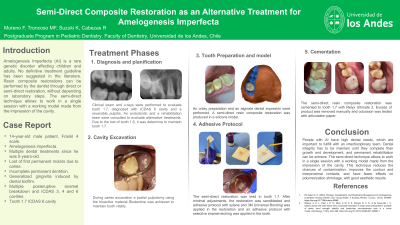Caries
394 - Semi-Direct Composite Restoration as an Alternative Treatment for Amelogenesis Imperfecta

.jpg)
Florencia Moreno, DDS
Student
Universidad de Los Andes, Santiago, Chile
Universidad de Los Andes, Chile
Santiago, Region Metropolitana, Chile- BW
Bárbara Weihrauch, -
Universidad de Los Andes
- MT
María-Fernanda Troncoso, -
Universidad de Los Andes
- RC
Roxana Cabezas, -
Universidad de Los Andes
- BW
Bárbara Weihrauch, n/a
Universidad de los Andes
Santiago, Region Metropolitana, Chile - RC
Roxana Cabezas, -
Program Director
Universidad de Los Andes
Santiago, Region Metropolitana, Chile
Presenting Author(s)
Co-Author(s)
Research Mentor(s)
Program Director(s)
Amelogenesis Imperfecta (AI) is a rare genetic disorder affecting children and adults. No definitive treatment guideline has been suggested in the literature. Resin composite restorations can be performed by the dentist through direct or semi-direct restorations, without depending on laboratory steps. The semi-direct technique allows to work in a single session with a working model made from the impression of the cavity. This technique reduces the chances of contamination, improves the contour and interproximal contacts, and have fewer effects on polymerization shrinkage, with good aesthetic results. The aim of this report was to describe this technique on a patient with AI.
A 14-year-old male adolescent presents AI, with severe damage to his teeth. Tooth 1.6 was lost and 1.7 presents an ICDAS 6 cavity, with bad prognosis. We performed a semi-direct composite filling as an intermediate restoration, to return its functionality and improve his quality of life, with the aim to make a full crown for the tooth when he is older.
The patient will continue to be monitored in pediatric dentistry until he finishes his development and can complete a permanent treatment.
This report shows an alternative treatment for patients with AI tthat can improve their quality of life.
Identify Supporting Agency and Grant Number:

.jpg)